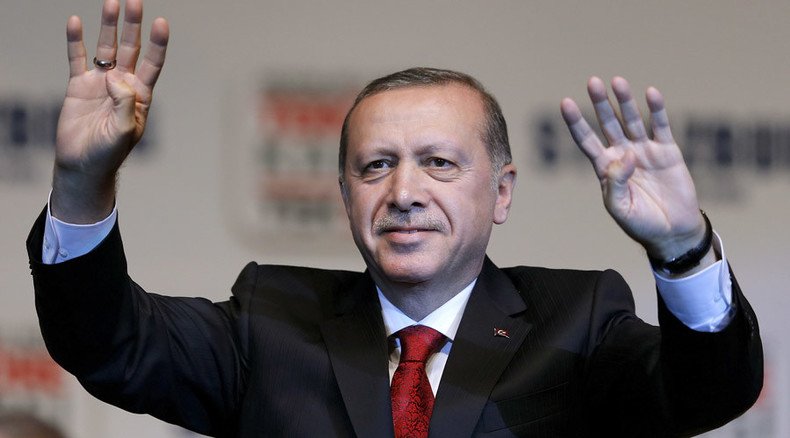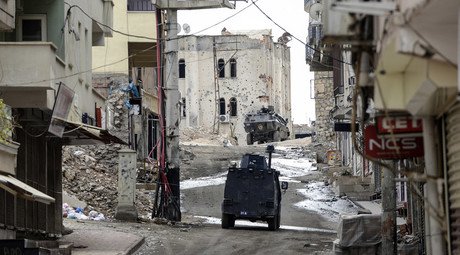‘Tens of millions of Turkish Kurds feel hard-done by the government’

The outbreak of violence against the Kurds paid off for the ruling AK Party in Turkey and the president managed to get the majority he needs in parliament, says Shwan Zulal, a Middle East political risk analyst.
At least seven people were killed by gunfire in the Turkish city of Silvan when government forces fought militants from the banned Kurdistan Workers' Party known as the PKK. Turkish tanks and armored vehicles have been patrolling the streets where a curfew has entered its second week.
RT: Do you think that President Erdogan's policy at the moment will inflame the situation?
Shwan Zulal: Well, it has. If we look at the recent events over the last six months since June’s election, the violence has escalated, and obviously the president’s party didn’t get the majority they wanted in June. Given the escalation of violence and what happened a couple of weeks ago in the run-up to the election where the violence really paid off with the ruling AK Party in Turkey and the president managed to get the majority he needs in parliament. So, I don’t see any changes in a policy because obviously it paid off very nicely to increase the votes by nearly a few million votes and getting 49 percent of the seats in parliament.
I don’t see the violence abating. This nothing news – if we look back even in September at the town of Silvan where there was two weeks of curfew; there, tens of people got killed and civilians got killed in crossfire between the PKK and Turkish military. And at the time there was absolutely no access to journalists, which we see as a very similar pattern at the time in Silvan. I can’t see the way forward until there is some sort of revival of the peace process. But given the way the politics has been stoked and the division within Turkey has been stoked in the last few months, I don’t see the violence decreasing. I only can see the violence increasing. This is all taking it from a regional respective. If we look at Syria and what is happening in there, you look at the pictures from the town of Silvan, and you just see as if you are looking at pictures from Aleppo or any other war-torn [place] in Syria, like Kobani.
RT: Do you think there is a danger of an all-out war against the Kurds? Is that a real possibility at this point?
SZ: I think we are still some way away [from such a scenario], but the President’s intent is very clear and the Prime Minister made it clear that they want to liquidate PKK. And… these wars have been going on for over 30 years. The Turkish army spent billions in the 80s and 90s in an all-out war with PKK, but they still didn’t really manage to eliminate it. So, the idea that they can eliminate or liquidate – I am paraphrasing – the PKK is farfetched; it is just not possible because the PKK are well-dug in and now they have very good access to all the surrounding areas – be it Iran, Iraq or Syria. Especially, with Syria it is almost like a buffer for them. And the Turkish army cannot venture into those areas. So, an all-out war is not going to benefit anyone with the regional problems, the regional conflicts inflamed everywhere else. I think Turkey in the long run will be much worse off for getting involved in escalating the violence… because let’s not forget there are tens of millions of Kurds in Turkey. Yes, maybe not all of them will support PKK, but there is a large majority who feel hard-done by the Turkish government - be it violation of human rights, be it language issues, etc.
RT: Is there any hope that with the HDP [Peoples' Democratic Party] in parliament with 10 percent will alleviate the situation?
SZ: I think we had a very good chance in June for the HDP as a beacon of hope for all of Turkey because this problem is not only about Kurds, it is about everyone in Turkey, because people in Turkey just want to have a normal life and have a growing economy and go about their daily life - including the Kurds and Turks. In June, the HDP was trying to change that trend coming from over 30 years of fighting. HDP was to give the people an alternative. But what we saw because they are very popular - they managed to get 13.5 percent of the vote, they got a good chunk of MPs in parliament, and the ruling party in Turkey they didn’t like that and obviously used that against the Kurds, and try to pretend that the stability of the country is at stake if you have a party like HDP. HDP is for all Turks; yes, it is a pro-Kurdish party and everyone talks about it but the reality is that it is a party which can actually take Turkey really forward and change the status quo as we saw it now in the streets of Silvan… and goodness knows what other town is going to be next – this can’t really continue.
LISTEN MORE:
The statements, views and opinions expressed in this column are solely those of the author and do not necessarily represent those of RT.













